What is Iceland known for? As a land of fire and ice, this captivating Nordic island has earned a global reputation for its breathtaking landscapes, untamed wilderness, and a unique blend of natural wonders. From towering glaciers and powerful waterfalls to mesmerizing geothermal activity and a rich Viking heritage, Iceland offers an abundance of experiences that leave visitors in awe.
Whether it’s soaking in geothermal hot springs, exploring lava caves, or encountering wildlife in its pristine habitats, Iceland’s diverse offerings continue to captivate the hearts and minds of travelers from around the world. So, without further delay, let’s delve into some of the most important reasons Iceland is known worldwide.
Natural Landscapes | What is Iceland Known For
Iceland captivates visitors with its stunning natural landscapes, which encompass glaciers, waterfalls, geysers, volcanoes, and geothermal areas. Thus, its unique geological features attract tourists from around the world, making it a renowned destination for nature enthusiasts.
1. Jökulsárlón (Glacier Lagoon):
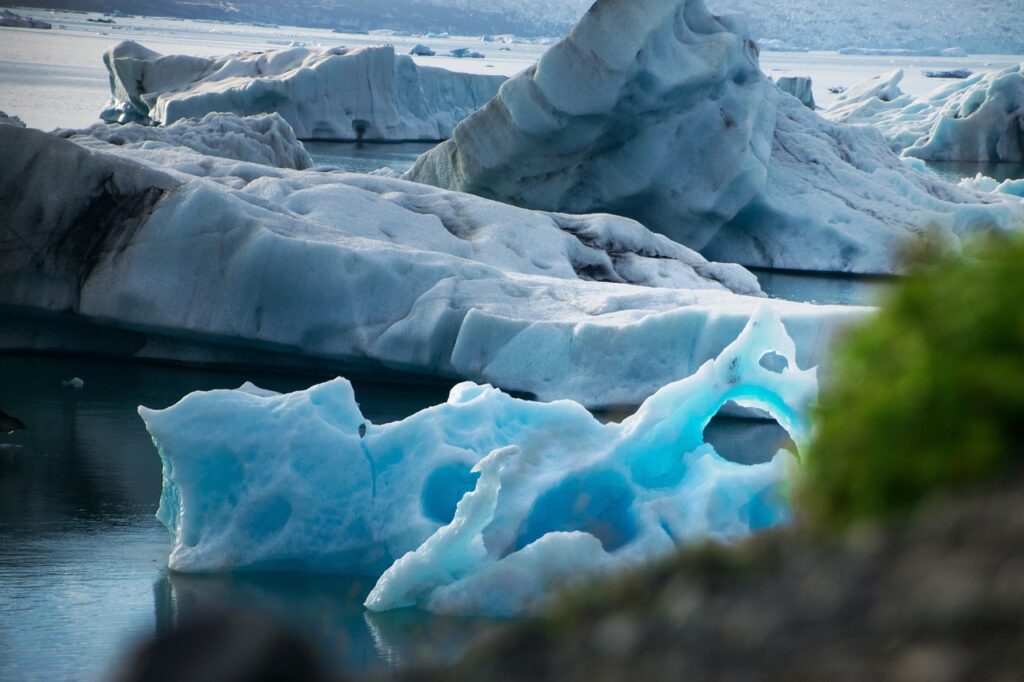
Situated in southeastern Iceland, Jökulsárlón, also known as Glacier Lagoon, enthralls visitors as a breathtaking natural wonder.
This glacial lake, which brims with crystal-clear turquoise water, surrounds itself with majestic icebergs that calve from the nearby Breiðamerkurjökull glacier. Visitors find themselves captivated by the surreal beauty of the lagoon, where icebergs of various shapes and sizes serenely float, crafting a mesmerizing scene.
Additionally, it serves as an ideal spot for boat tours. Therefore, it allows guests to cruise among the icebergs and witness the interplay of light and color reflected in the glacial water.
2. Geysir & Strokkur:
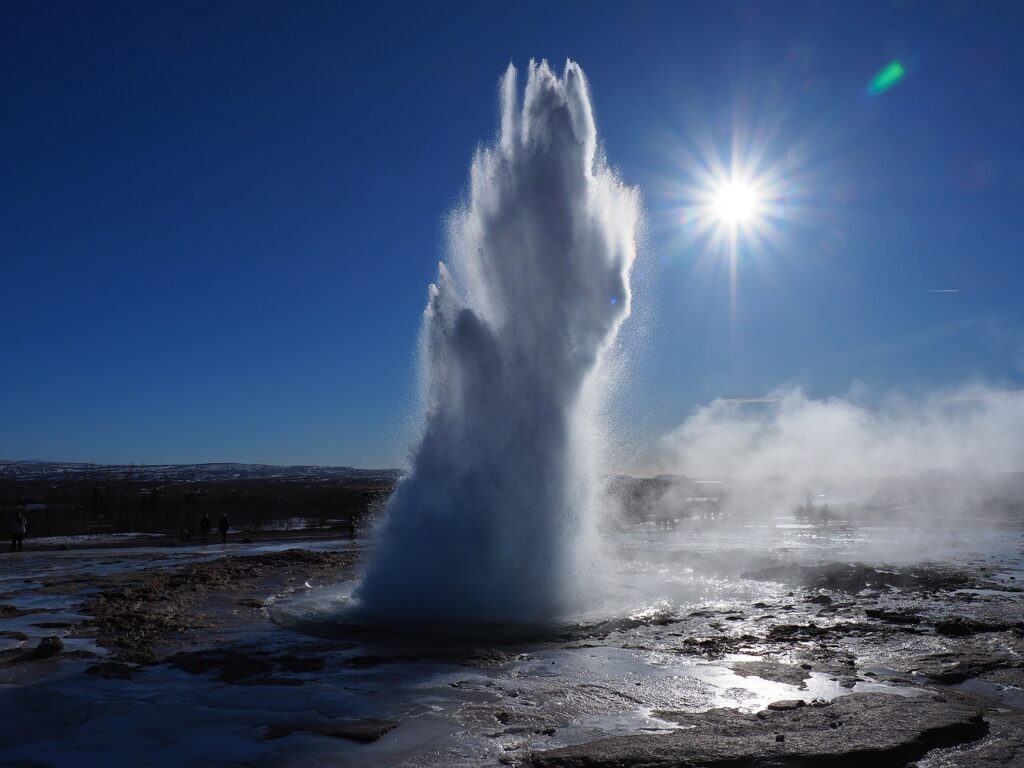
Positioned in the geothermal area of Haukadalur, Geysir takes its place as one of Iceland’s most famous geysers and the namesake of all geysers worldwide. It proudly exhibits the raw power and natural spectacle of erupting hot springs.
However, while Geysir itself shows reduced activity today, its neighbor Strokkur steals the show with its frequent eruptions. Strokkur propels scalding water up to 30 meters high, captivating visitors with its impressive displays.
Visitors eagerly gather around, anticipating each eruption with excitement as Strokkur mesmerizingly performs its display every few minutes. Moreover, the bubbling and hissing geothermal activity in the area creates an otherworldly experience, continually reminding us of the fiery forces beneath our feet.
3. Diamond Beach:
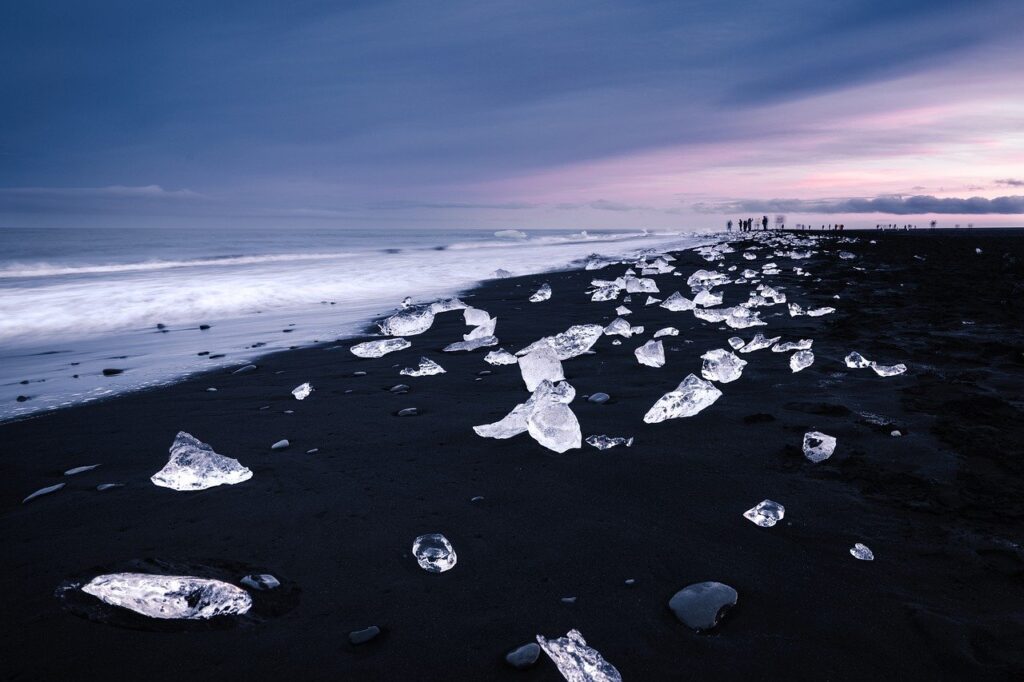
Diamond Beach, located near Jökulsárlón Glacier Lagoon, is a magical shoreline adorned with glittering ice diamonds.
As icebergs from Jökulsárlón make their way to the ocean, they get washed ashore, creating a striking contrast against the black volcanic sand. These translucent ice chunks, glistening in the sunlight, resemble scattered diamonds, hence the name.
Walking along the beach, you’ll be amazed by the myriad of ice sculptures in various shapes and sizes. A sense of enchantment fills the air as these sculptures create a truly captivating and surreal ambiance.
4. Waterfalls:

Iceland is renowned for its numerous majestic waterfalls that cascade through its dramatic landscapes. From the mighty Gullfoss, plunging into a rugged canyon, to the elegant Seljalandsfoss, offering a unique opportunity to walk behind its veil of water, each waterfall holds its own allure.
These majestic natural wonders captivate visitors with their awe-inspiring beauty, thundering sounds, and delicate mist that fills the air. Moreover, they provide a chance to connect with the untamed power of nature and experience the raw force of cascading water firsthand.
5. Volcanoes:
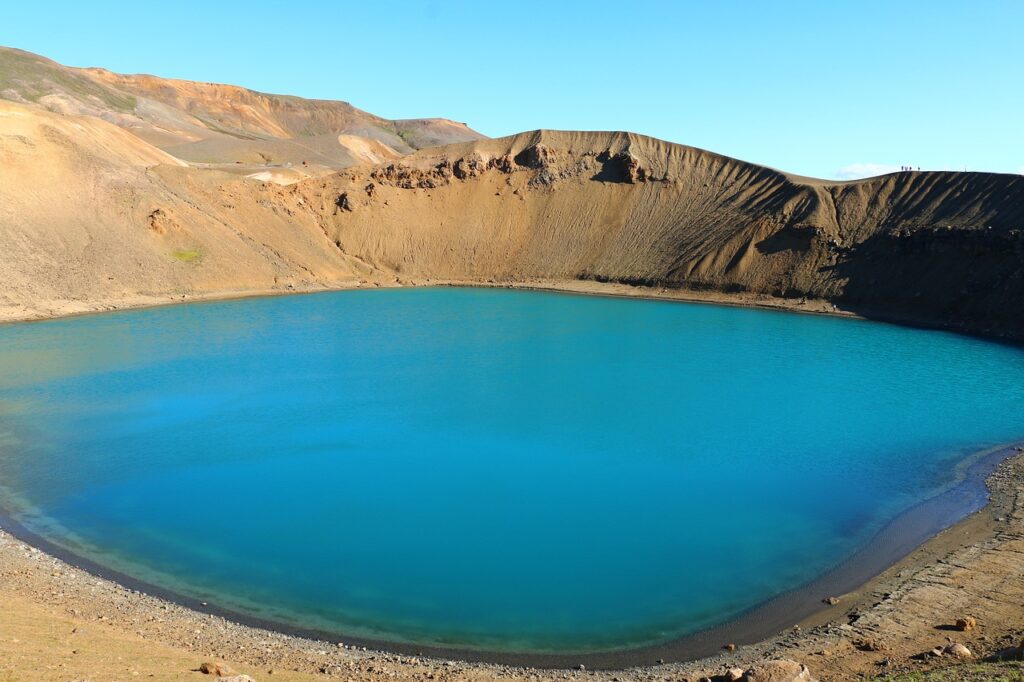
Hiking to the summit of volcanoes such as Hekla or exploring volcanic craters like Krafla’s Víti offers an extraordinary opportunity to witness the geological forces that have shaped this captivating island. In doing so, adventurers embark on a remarkable journey, venturing into the very heart of Iceland’s fiery past.
Moreover, Iceland’s volcanic wonders reveal the immense power and constant transformation that lie beneath our planet’s surface. Ultimately, these geological marvels invite intrepid explorers to immerse themselves in a world where the raw forces of nature shine
Northern Lights | What is Iceland Known For
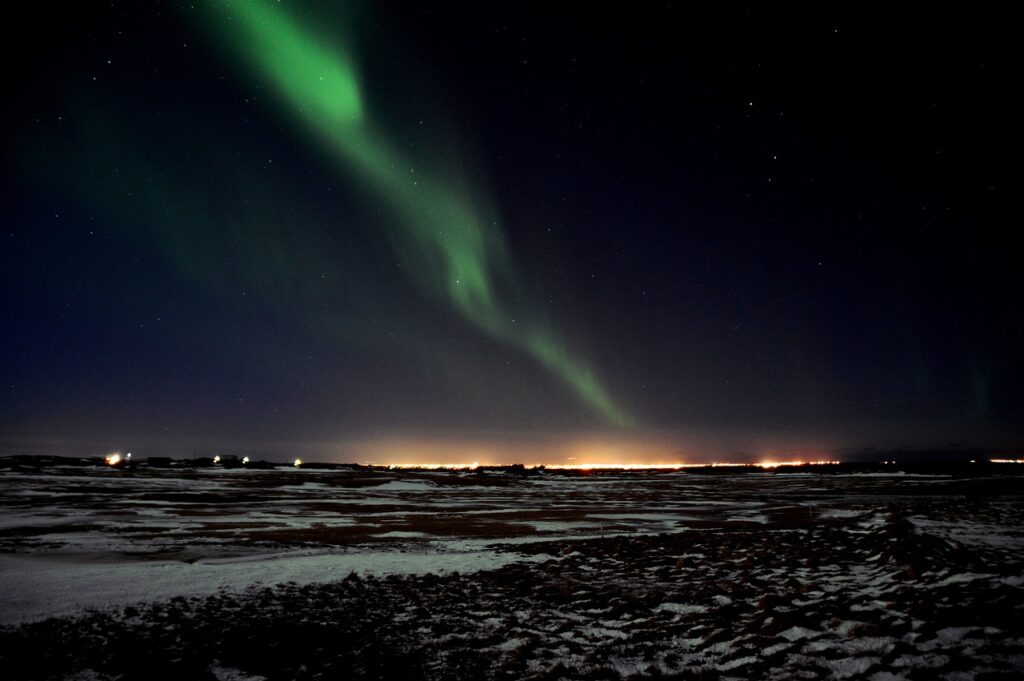
Iceland stands as one of the premier destinations to witness the captivating dance of the Northern Lights. Also known as Aurora Borealis, this phenomenon enthralls visitors with its mesmerizing displays of shimmering lights in the night sky.
Perched on Iceland’s edge, the Northern Lights unfurl their vibrant spectacle, thereby captivating viewers against the backdrop of untouched landscapes. With its dark and unpolluted skies, Iceland offers optimal conditions for experiencing the celestial spectacle in all its glory. At the same time, the volcanoes, black sand beaches, and icy landscapes further enhance the allure of the Northern Lights. Together, these components formulate a magical and otherworldly setting.
Outdoor Activities | What is Iceland Known For
Iceland entices with its many outdoor activities, each brimming with exhilarating experiences. Indeed, from heart-pounding hikes to awe-inspiring ice climbing, horseback riding through scenic landscapes to captivating glacier tours, and the thrilling encounters of whale watching, this land of diverse landscapes offers an array of adventures. Adventurers are invited to delve into the untamed beauty, yet to emerge transformed, captivated by the indomitable spirit of Iceland.
1. Glacier Hiking:
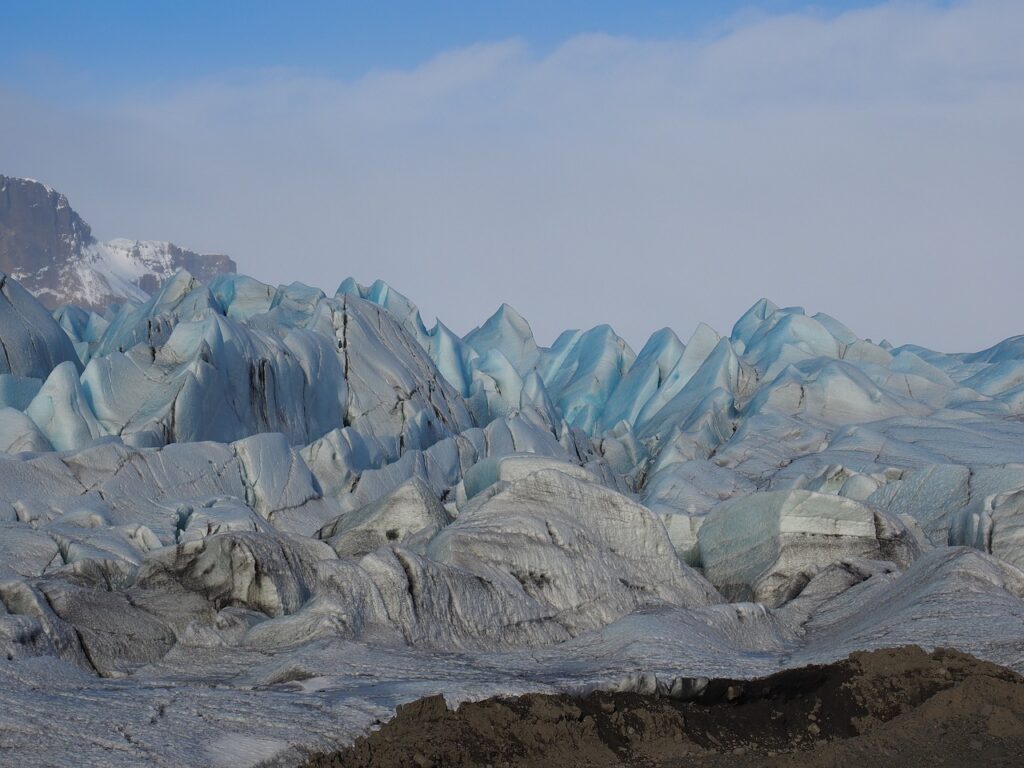
Without a doubt, embarking on an exploration of Iceland’s awe-inspiring glaciers presents a thrilling adventure. Visitors can witness stunning ice formations, crevasses, and unique landscapes, all while their senses are immersed in the pristine beauty of this icy wonderland.
Undoubtedly, the sheer magnitude and grandeur of the glaciers evoke a sense of awe and reverence, as nature’s frozen sculptures unfold before their eyes. The crackling sound of ice, the shimmering blue hues, and the crisp mountain air combine to create a truly unforgettable experience. Truly, it’s a journey that takes you to the heart of Iceland’s frozen realm, where the forces of nature have sculpted a breathtaking landscape unlike anywhere else on Earth.
2. Golden Circle Tour:
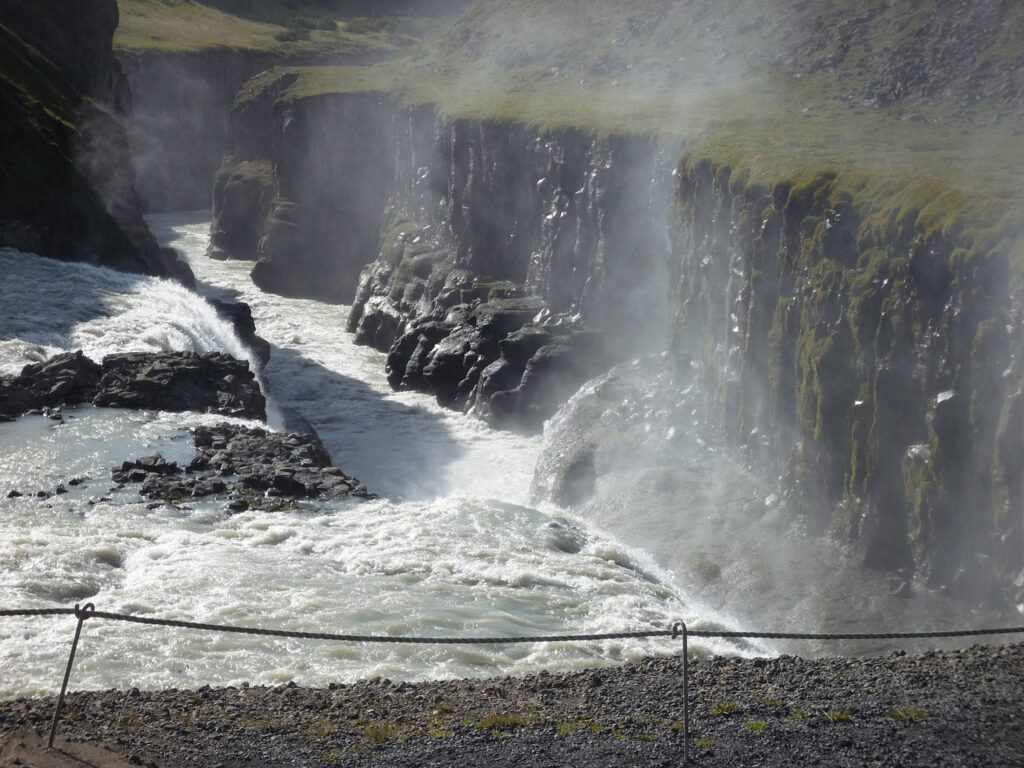
This classic route encompasses three iconic natural wonders, namely Þingvellir National Park, the Geysir geothermal area, and the majestic Gullfoss waterfall. In other words, you get to experience the breathtaking essence of Iceland’s diverse landscapes all in one remarkable journey. Clearly, this has to be a bucket-list experience for any nature enthusiast or adventurous traveler!
3. Whale Watching:
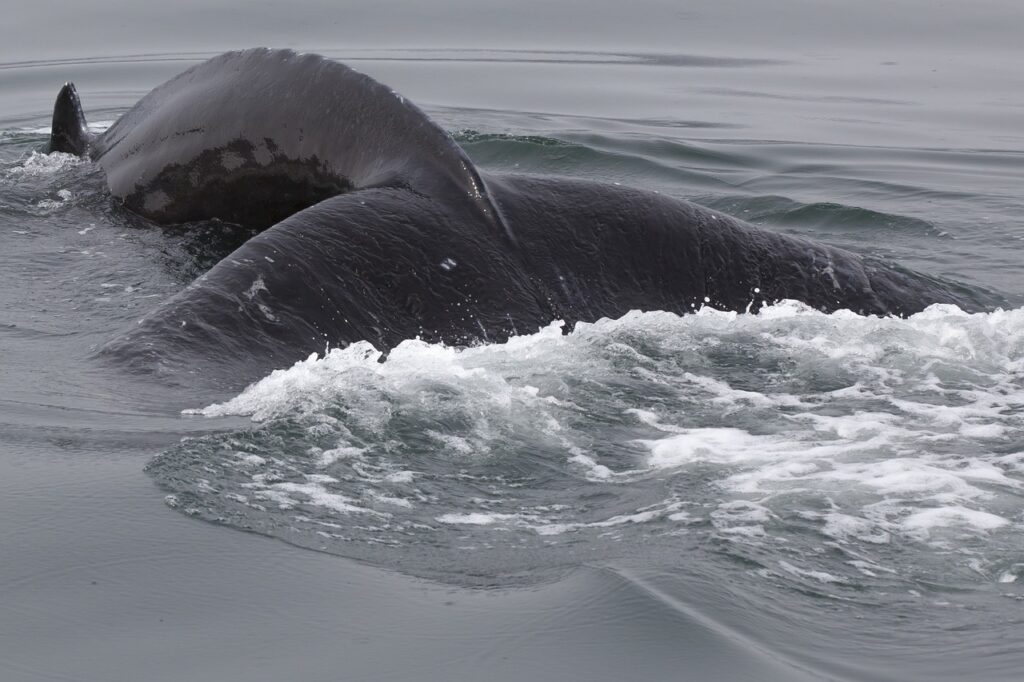
Iceland’s coastal waters are teeming with a rich variety of marine life and, consequently, venturing on a whale-watching excursion provides an exceptional opportunity to encounter majestic whales, dolphins, and other fascinating sea creatures.
4. Snorkeling or Diving in Silfra:
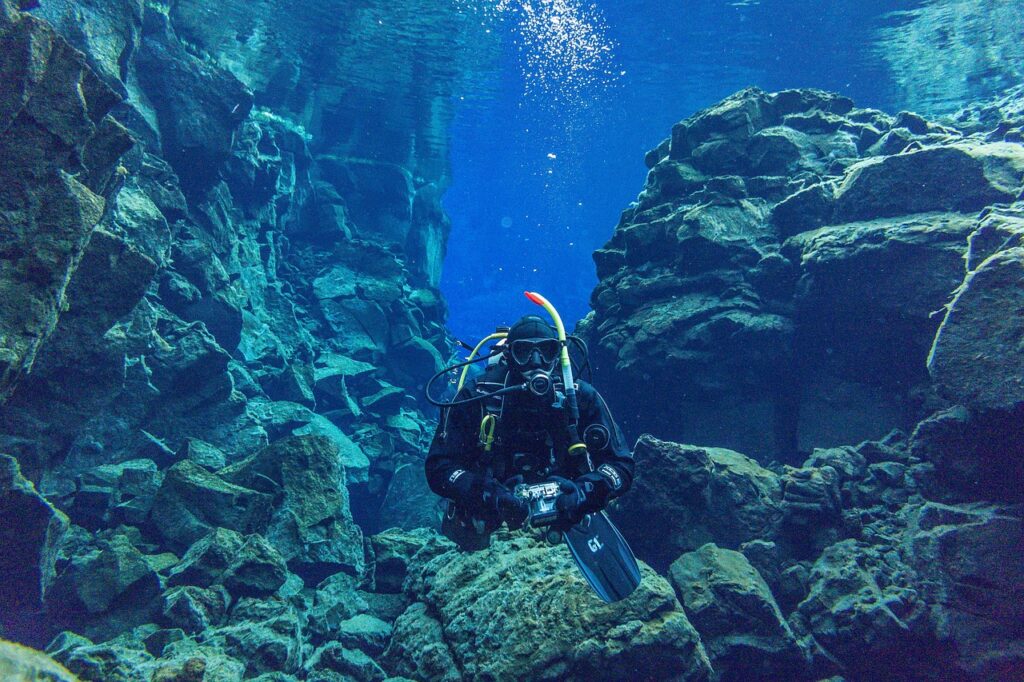
Silfra is a fissure located in Þingvellir National Park, where visitors can immerse themselves in crystal-clear waters between the Eurasian and North American tectonic plates, thus offering a unique underwater experience.
As a matter of fact, divers have the incredible opportunity to literally touch two continents at once, as they navigate the narrow gap formed by the diverging tectonic plates. Truly, it’s a surreal sensation that allows them to physically connect with the geological forces shaping the Earth’s crust and appreciate the magnitude of Iceland’s geological significance.
5. Trekking and Camping in Landmannalaugar:
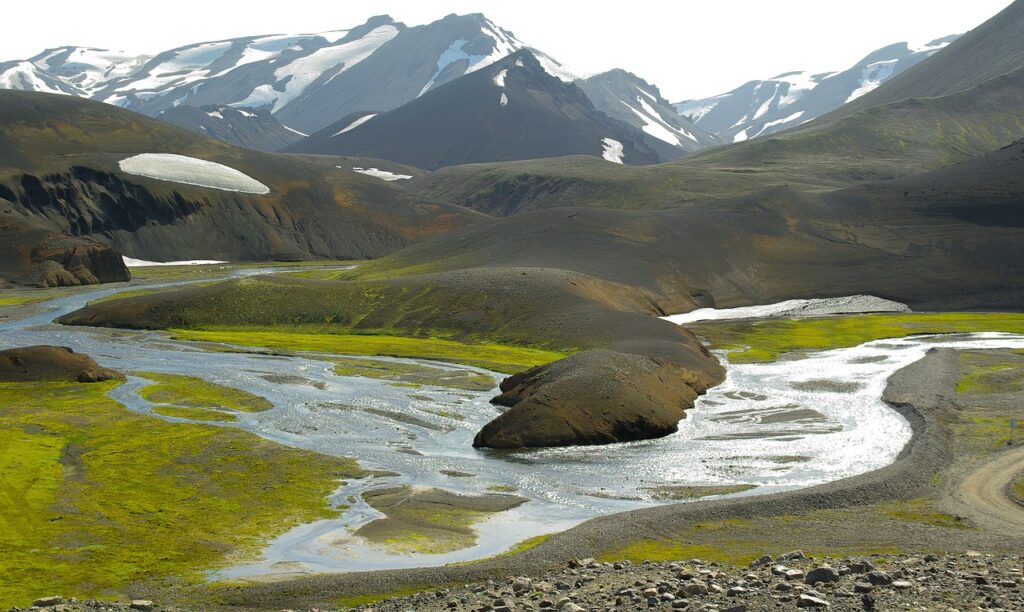
For one thing, Landmannalaugar stands out as a destination of incredible beauty, nestled in the rugged highlands of Iceland. Known for its vibrant rhyolite mountains, geothermal hot springs, and breathtaking hiking trails, this area offers a mesmerizing blend of colors and natural wonders. In addition, Landmannalaugar boasts a network of captivating hiking trails that cater to adventurers of all levels. For this reason, it is a haven for outdoor enthusiasts, providing endless opportunities to explore.
Also, camping in Landmannalaugar is popular among visitors, as it allows individuals to fully experience the serene atmosphere of the highlands. However, it’s worth noting that camping facilities in Landmannalaugar may be limited. Therefore, it is essential to follow responsible camping practices and adhere to any guidelines or regulations set by local authorities.
6. Horseback Riding:
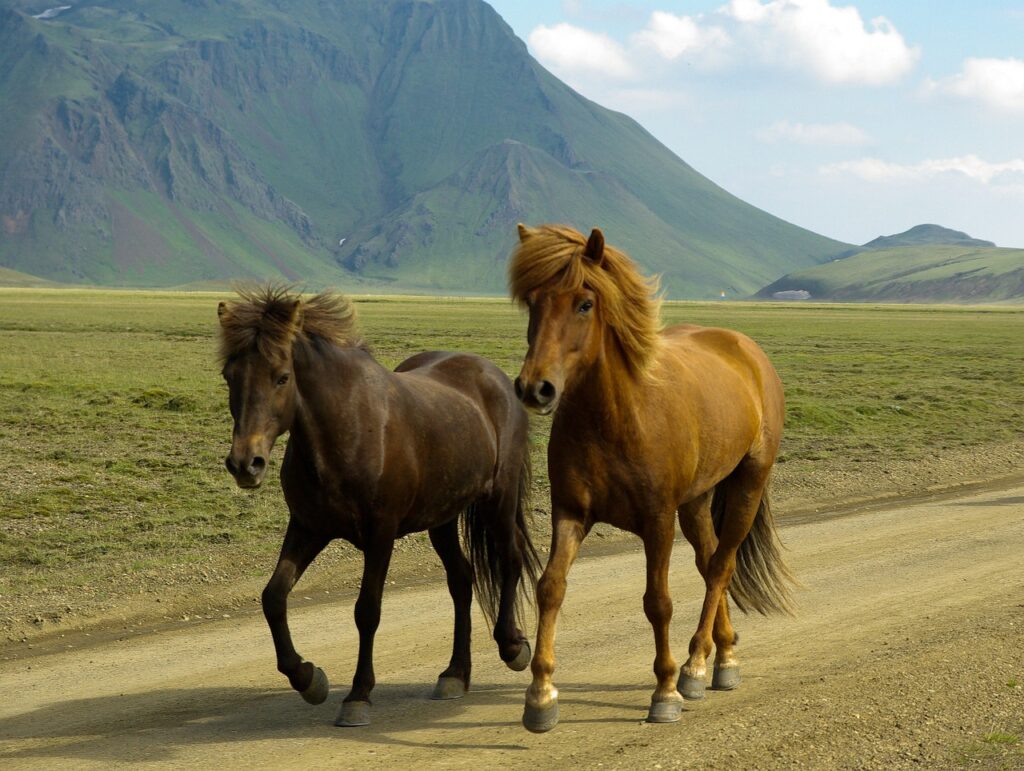
Icelandic horses are a beloved symbol of the country’s heritage. Going on a horseback riding tour allows visitors to experience the unique tölt gait, while they explore the breathtaking countryside. Of course, the friendly and gentle nature of Icelandic horses adds to the joy and tranquility of the ride, creating an unforgettable connection between rider and horse. Because of their compact size and surefootedness, they are can traverse diverse terrains, including rugged landscapes and narrow trails.
7. Ice Climbing:
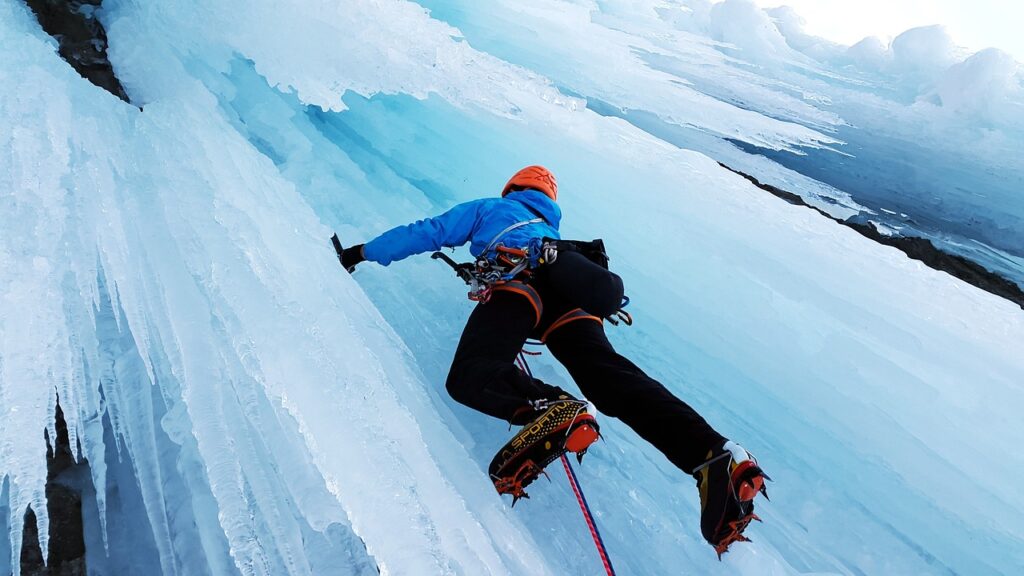
While embarking on the journey of scaling the icy vertical faces of Iceland’s glaciers, adventurers are met with a challenging outdoor activity. Yet, with the guidance of experienced instructors and their own determination, they conquer the formidable ice walls and unlock a sense of accomplishment that resonates deep within their souls.
Besides the physical and mental challenges, the awe-inspiring beauty and serenity of the glacier surroundings create an unforgettable backdrop for this extraordinary endeavor.
Blue Lagoon | What is Iceland Known For
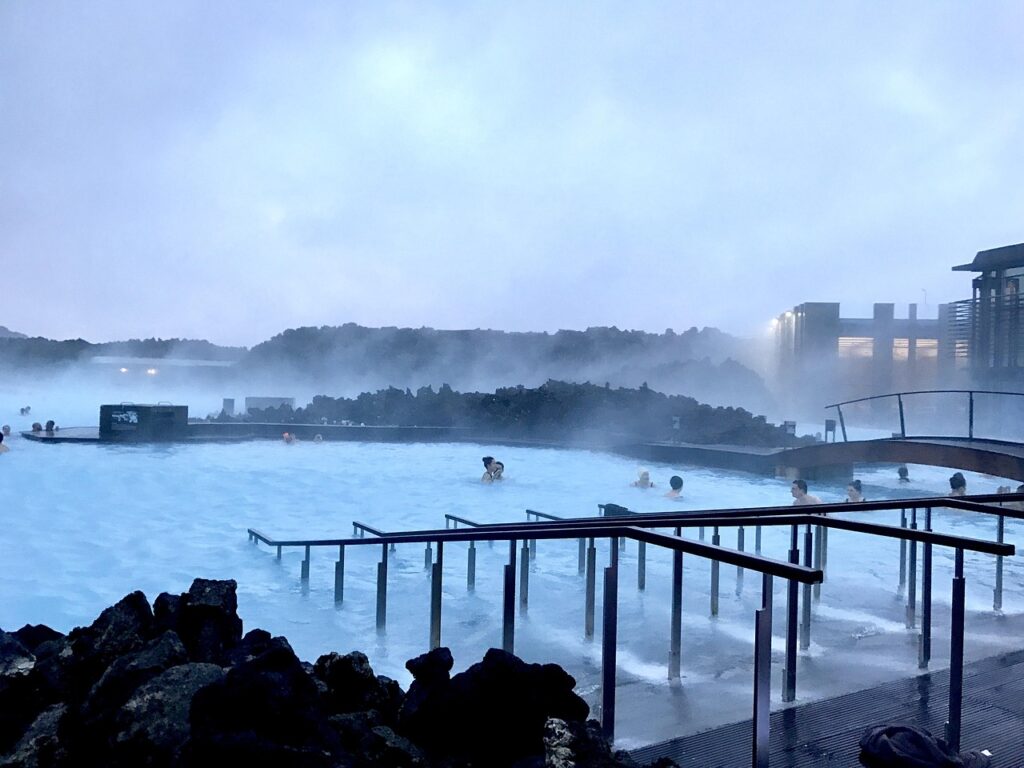
The Blue Lagoon is an iconic geothermal spa nestled in the dramatic volcanic landscapes of Iceland. This geothermal wonderland in the Reykjanes Peninsula boasts milky-blue mineral-rich waters, heated by underground lava flows. Manifestly, it has become a must-visit destination for travelers from around the world, seeking relaxation and rejuvenation.
The Blue Lagoon offers visitors a unique opportunity to soak in its warm geothermal waters, renowned for their therapeutic qualities. What’s more, as guests submerge themselves in the mineral-rich, silica-infused waters, they experience an unrivaled sense of tranquility and well-being.
Viking History | What is Iceland Known For

The Viking Age, spanning from the 8th to the 11th centuries, played a significant role in shaping Iceland’s cultural heritage. Icelandic sagas, epic tales of Viking adventure, have captivated audiences worldwide, hence contributing to the popular image of Vikings.
In modern Icelandic culture, the Viking legacy remains a source of pride and inspiration. Appropriately, various cultural expressions, including festivals, traditional arts and crafts, and historical reenactments, celebrate the Viking heritage. Additionally, Viking motifs and symbols can be found in contemporary design, fashion, and popular culture, serving as a connection to the past while embracing the Viking spirit.
Moreover, Iceland offers visitors the chance to delve into its Viking history through museums and archaeological sites. Notably, these showcase artifacts, replicas of Viking ships, and immersive exhibitions.
This blend of ancient traditions and their presence in modern Icelandic culture makes the Viking legacy an enduring and influential aspect of Iceland’s identity. Remarkably, it invites visitors to explore the country’s fascinating historical roots, delving into a captivating tapestry of the past.
What Is Iceland Known For? A Few More Reasons That Set It Apart
- Firstly, Iceland’s geothermal energy utilization is renowned, with the country harnessing its abundant geothermal resources for heating and electricity production. Obviously, this has made Iceland a global leader in sustainable energy practices.
- Secondly, the abundance of hot springs and natural baths is another highlight, including the famous Blue Lagoon, where visitors can relax in mineral-rich geothermal waters while surrounded by stunning landscapes.
- Thirdly, Iceland’s unique geology and volcanic activity attract scientists and geology enthusiasts from around the world. Put simply, the island offers a living laboratory for studying geological phenomena and understanding the Earth’s processes.
- Moreover, Iceland’s commitment to environmental preservation and conservation sets it apart. In fact, the country takes great strides to protect its pristine landscapes, biodiversity, and delicate ecosystems. As a result, it is a model for sustainable tourism and environmental stewardship.
- Additionally, Iceland’s cultural scene is vibrant and captivating. From its thriving music festivals and innovative contemporary art to its rich folklore and literary heritage, Iceland’s cultural contributions resonate globally and captivate the imagination of many.
- Furthermore, the opportunity to witness incredible wildlife, including seabird colonies, seals, and Arctic foxes, adds to Iceland’s allure. Needless to say, the country’s untouched wilderness provides a haven for diverse species.
- Lastly, Iceland’s commitment to gender equality and progressive social policies has garnered international recognition. Indeed, the country ranks highly in gender equality indices and serves as an inspiration for promoting inclusivity and diversity.
Eleven Surprising and Interesting Facts about Iceland!
- Firstly, Iceland is home to the world’s oldest parliament, the Alþingi, established in 930 AD.
- Secondly, Iceland has gained recognition as the “Land of Fire and Ice” owing to its remarkable combination of glaciers and volcanoes, showcasing contrasting natural features.
- Thirdly, Iceland stands out as one of the least densely populated countries in Europe, boasting a population of approximately 360,000 individuals.
- Moreover, Icelandic folklore weaves a tapestry of enchanting tales, featuring hidden beings like elves and mythical creatures, embraced and cherished by the local community.
- Also, Iceland has a high literacy rate, with one of the highest numbers of book publications per capita in the world.
- Due to Iceland’s geographical isolation, the language has remained relatively unchanged for centuries, allowing Icelanders to read ancient Viking sagas in their original form.
- Iceland is a leader in renewable energy production, with over 85% of its total energy consumption derived from renewable sources.
- Despite its name, Iceland boasts a surprisingly mild climate.
- Iceland is home to Europe’s largest glacier: Vatnajökull.
- Iceland, despite its small population, has a thriving music scene and has produced several internationally acclaimed bands and musicians.
- Lastly, Iceland proudly stands as the smallest nation to have ever qualified for the FIFA World Cup, demonstrating its fervor for football and remarkable achievements on the global stage.
What is Iceland Known For? Final Thoughts
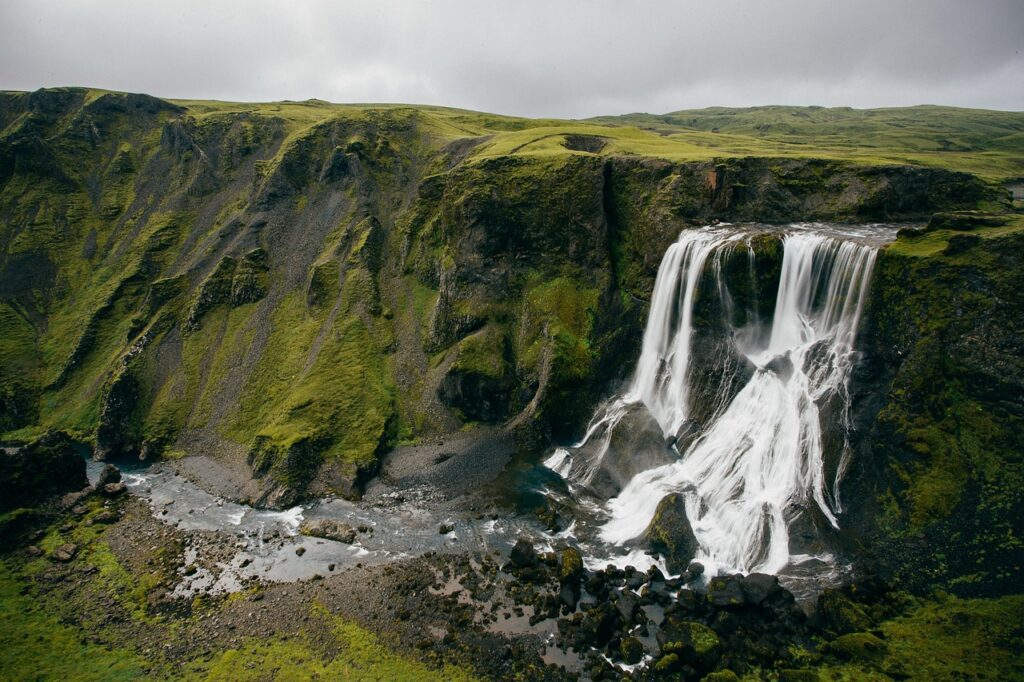
In conclusion, Iceland’s global reputation as a destination of wonder and adventure is well-deserved. Without a doubt, its awe-inspiring glaciers, captivating landscapes, and vibrant natural wonders offer a myriad of experiences that leave a lasting impression on travelers.
From the thrill of scaling icy peaks and exploring hidden crevasses to the enchantment of witnessing the mystical Northern Lights dance across the sky, Iceland truly captivates the hearts of those who venture to its shores. Whether it’s hiking through picturesque highlands, embarking on a whale-watching excursion, or immersing oneself in the crystal-clear waters of Silfra, Iceland beckons adventurers from all corners of the world to embrace its untamed beauty.
With warm hospitality, rich Viking heritage, and endless opportunities for outdoor exploration, Iceland continues to hold its place as a remarkable destination that leaves visitors in awe of its extraordinary landscapes and the spirit of adventure that permeates its very essence.
